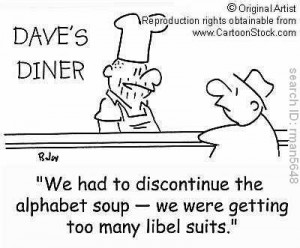September 18, 2011
Have you ever said one thing but others decode it differently? Words are powerful by the way we arrange them in speech and on paper. A single word can change a whole idea. For instance, what if you published a story and used the word her rather than the word Susan? The word her can apply to more than one person and takes a direction that you did not mean for it to go. It is important to clarify in speech when speaking about numerous people, or in general, the way we may use a pronoun. Libel is defined by Webster as, “a written or oral defamatory statement or representation that conveys an unjustly unfavorable impression.” Libel can be claimed in almost any publication.
Picture that you a writer for the BG News. You do a story covering the BG Chamber of Commerce. You speak with a board member about a present issue in which you write, “they decided not to support a new local business to the city of Bowling Green that will donate three percent of its annual earnings to the university.” The word they is vague and could pertain to members that do indeed admire and support the business. The community knows members on the board and it could give a bad representation to certain members. What do you think? Do you think using the word they in this context are appropriate or should the writer state it in a better form?
2. Legal Background
In New York Times Co. v. Sullivan the Supreme Court ruled in favor of a reporter that was accused of libel. An elected official alleged that he had been libeled but, the catch is proving how damages apply to him. In the article they portrayed the police as having over aggressive methods. The article used the word police. As the city commissioner he technically supervised the police, therefore, he claimed that word made him look like the police acted the way they did because of his orders. The court found that the commissioner cannot claim actual malice without hard proof that the article tried to make him look bad. His name was not mentioned anywhere and one would really have to stretch the mind to link him to the police department’s actions. Therefore the reporter was sought to be in negligence and unaware that evil intentions were meant.
Although the Supreme Court favored for the reporter it is important to know what can be harmful and to be aware of the words we use.
3 Three Questions
1. What would be the first thing you would do if you were accused of libel?
2. Do you think differently now about the way words can be twisted in public forum?
3. Should you have review your story with public figures involved before you release it to eliminate any possible threats of libel?
3 thoughts on “Words With Multiple Meanings”
Leave a Reply
You must be logged in to post a comment.

September 23rd, 2011 at 12:10 am
1. If I was accused of libel, I would first find out if the person who accused me actually made a valid claim, that blamed me for actual malice, rather than negligence. Obviously, both claims would cause concern, but if there were claims about actual malice, there would be more serious ramifications.
2/3. If the journalist is concious about writing clearly and using basic writing and attribution skills to ensure that he/she is representing a source to the best of their ability, there should be no reason to closely examine the story for possible threats of libel. If each journalist took the time and effort to review stories based on the possible harm to public figures, than the free course of the truth may not be permitted. Chilling effect, anyone?
September 23rd, 2011 at 8:44 am
1. I would look back at my story and review it to see if the libel claim was valid. If it were but was unintentional, I am sure I would apologize and try to make amends.
2. I don’t think differently about it, as it is something that I have been aware of, largely from folowing politics closely.
3. Absolutely not. That is an unreasonable request due to the time burden that it would place on the reporter. A journalists should try to be as accurate and factual as possible with as many sources as possible.
December 14th, 2011 at 12:04 pm
Clarification: NYT v. Sullivan didn’t involve a reporter, it was an ad. The reason the police commissioner lost was not that he wasn’t identified in the ad – the court said he was, by virtue of his position – it was that actual malice had to be applied to public officials.